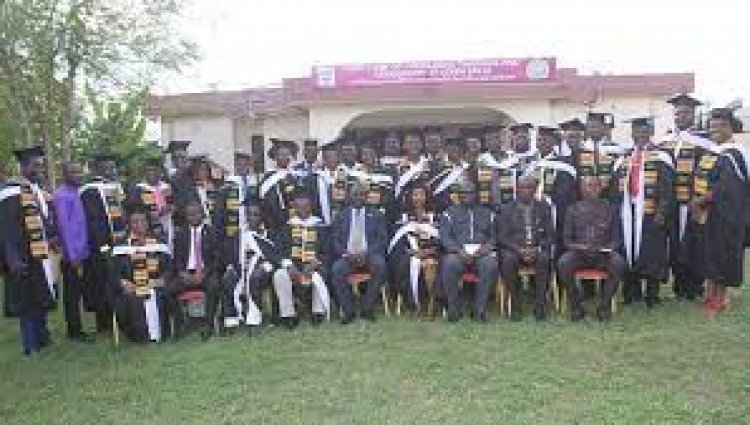20 Graduate As Alternative Dispute Resolution Practitioners
President of the Ghana National Association of Alternative Dispute Resolution Practitioners, Mr Owusu- Koranteng encouraged the graduating students to tap into the principles of Alternative Dispute Resolution in line with the customs and traditions of the country in resolving conflicts in society.

President of the Ghana National Association of Alternative Dispute Resolution Practitioners (GNAAP), Mr Daniel Owusu-Koranteng, has stated that Ghana has all it takes to become a major driver for conflict resolution in Africa.
According to him, Ghana has a conducive social and cultural environment for the promotion of ADR in the country.
Considering the importance of conflict resolution skills in the management of people and for the promotion of peacebuilding initiatives in society, Mr Owusu-Koranteng stressed the need for people that are placed in very responsible positions in the country to receive training in conflict resolution as part of the skill set required for efficient management of people.
These personalities, according to him, must include Ministers, Municipal Chief Executives, District Chief Executives, Chief Executive officers of State Institutions, Parliamentarians among others.
Mr Owusu-Koranteng made the call when he was speaking at the graduation ceremony of the students from the Institute of Paralegal Training and Leadership Studies (IPLS) on Saturday, June 26, 2021, in Accra
A total of twenty (20) students on Saturday, June 26, 2021, graduated from the Institute of Paralegal Training and Leadership Studies (IPLS) in Accra to practise as Alternative Dispute Resolution (ADR) practitioners in the country.
The graduands for the Professional Executive Master in Alternative Dispute Resolution (ADR) are sixteen(16) and the graduands for the Professional Executive Master in General Paralegal Studies are four(4).
The ADR and Paralegal Professionals had successfully gone through the 20-week training which qualifies them for the Professional Executive Master in Alternative Dispute Resolution (PEMADR) and Professional Executive Master in General Paralegal Studies.
Addressing the graduates, Mr Owusu- Koranteng, expressed the relevance of enhancing the capacity of ADR practitioners as the voice of conflict resolution in the country and the continent at large.
Mr Owusu- Koranteng encouraged the graduating students to tap into the principles of ADR in line with the customs and traditions of the country in resolving conflicts in society.
He congratulated the students for their tremendous effort and sacrifices to be trained as ADR practitioners.
He noted that an efficient justice system that is accessible to citizens especially the vulnerable in society is a sine qua non for peace in the country.
He said people resort to vengeance and self-help vigilante methods that promote lawlessness and reprisals that undermine the peace and stability of our nation.
"There is enough evidence to support the fact that, the use of ADR tools for conflict resolution achieves a quicker resolution of conflicts than the court system which is adversarial, expensive and time-consuming.
"For example, from January to December 2020 out of the 5,455 court-connected cases that were referred for ADR, 2,312 of the cases representing 42% of the cases were settled using ADR tools.
"The figures tell the story that ADR holds the key to the building of an efficient judicial system that is tailored to the needs of the people. Captains of business have demonstrated their preference for ADR in resolving disputes," he stated.
According to an efficient justice system that is accessible to citizens especially the vulnerable in society is a sine qua non for peace in our nation. People resort to vengeance and self-help vigilante methods that promote lawlessness and reprisals that undermine the peace and stability of our nation.
He noted that there is enough evidence to support the fact that, the use of ADR tools for conflict resolution achieves a quicker resolution of conflicts than the court system which is adversarial, expensive and time-consuming.
For example, he mentioned that from January to December 2020 out of the 5,455 court-connected cases that were referred for ADR, 2,312 of the cases representing 42% of the cases were settled using ADR tools.
According to him, the figures tell the story that ADR holds the key to the building of an efficient judicial system that is tailored to the needs of the people. Captains of business have demonstrated their preference for ADR in resolving disputes.
He asserted that many business contracts contain clauses agreed by the parties to the contract to use ADR tools to resolve disputes that arise between business partners.
According to him, many business contracts contain clauses agreed by the parties to the contract to use ADR tools to resolve disputes that arise between business partners.
"Likewise, the Labour Laws of our country and globally are based on a partnership between Labour and Capital represented by management in the structure of Standing Negotiating Committees and the use of ADR tool of Negotiation to resolve differences and conflicts," he added.
He stated that business and labour are the two key factors that drive the economy and society and if the two most productive factors have chosen the path of ADR for the resolution of conflicts, then it shows the direction of our justice system for today and the future.
He explained that ADR is not a new phenomenon for conflict resolution in our society and people believe in the principles of ADR for effective resolution of conflicts and for peacebuilding.
He suggested that the country needs to invest in the building of infrastructure to promote ADR and support institutions such as IPLS for the training and Paralegal professionals to promote the practice of ADR.
He commended the management and Lecturers of the IPLS for its commitment to the training of people with diverse professional backgrounds such as officers in the Security Service, the Clergy, Engineers, Medical Profession, Bankers, Assembly members Senior Public Servants, Trade Union leaders, Parliamentarians, chiefs Businessmen/Businesswomen, Educationists, Directors of NGOs among others to become ADR and Paralegal professionals.
The diverse professional background of ADR Professionals, he said will make the practice of ADR relevant to the different sectors of society.
Freeman Koryekpor Awlesu


 Joana Somiah
Joana Somiah 



































